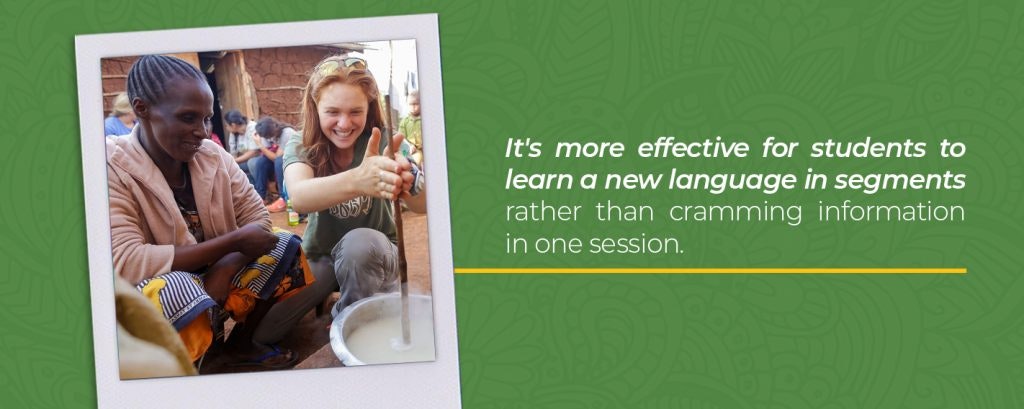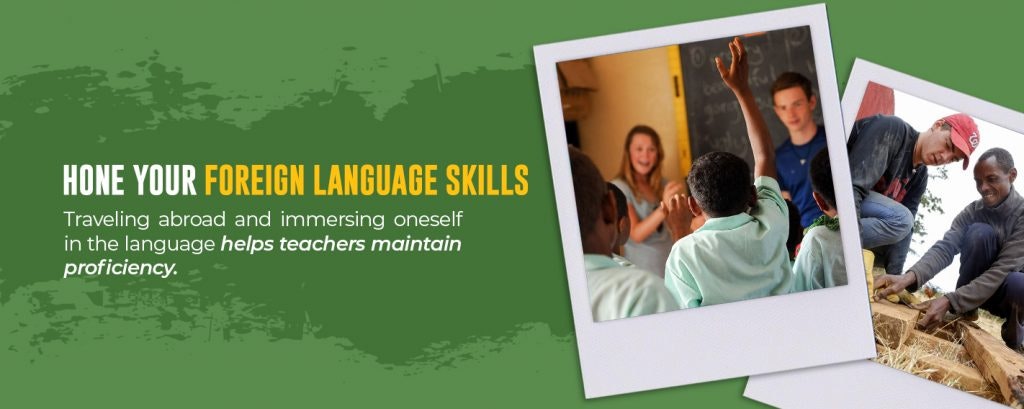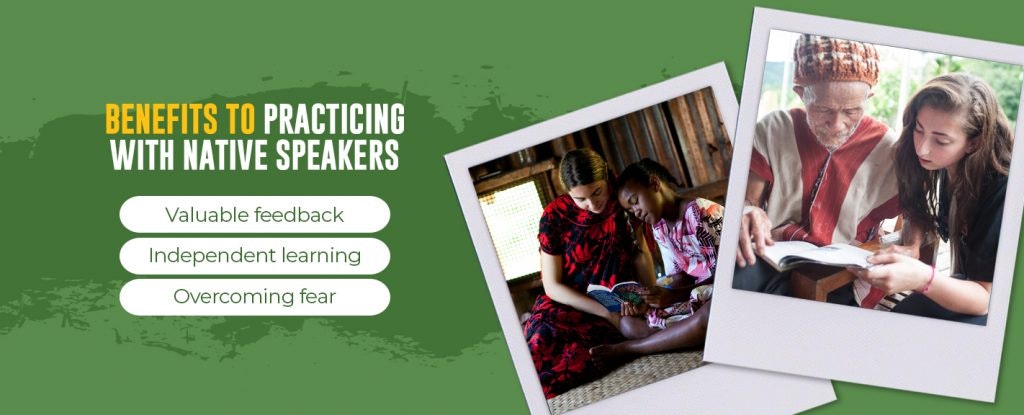Benefit #2: Expand your language focus
An educational travel program provides a unique opportunity to expand your language focus beyond the classroom. In many classrooms, language instruction tends to focus on a specific region or dialect.
For example, schools in California often teach Mexican Spanish due to the significant Mexican population, while schools in Europe typically emphasize the Spanish spoken in Spain. Traveling with your students to a country less represented in your curriculum allows them to explore the language’s diverse variations and deepen their understanding.
For instance, students learning Mandarin on an educational trip to China will encounter a variety of tones and dialects that may not be addressed in the classroom. Similarly, students studying Arabic will realize that its spoken form changes across countries and even within regions. A visit to Morocco or another Arabic-speaking country offers students the opportunity to practice a different dialect firsthand.
Read more: Why Learning a Language is One of the 5 Things You Should Do Before Applying to College
Benefit #3: Provide unscripted learning opportunities through travel abroad
As a language teacher, you probably arrange field trips to museum exhibits highlighting foreign artists. Perhaps you’ve set up cooking lessons featuring native, traditional cuisine. While these activities introduce students to the values and cultural practices of the people whose language they are learning, they often fall short of providing authentic experiences.
During a typical day traveling with your students in another country, they’ll observe cultural practices like greetings, food, transportation and art unfolding naturally around them. Bonus points if your trip aligns with a cultural holiday celebration, festival or even a local birthday! This immersive experience allows you to create a more dynamic and well-rounded curriculum filled with adventure and unexpected moments that enrich your students’ learning.
Related: How to Plan Teen Travel

Learn better in small, focused steps.
When you travel abroad with students, you’ll also have a chance to teach throughout the day in small segments. It’s more effective for students to learn a new language in segments rather than cramming information in one session.
Lastly, when students travel, they get to have rich cultural experiences which provide memorable and engaging learning opportunities. They can develop a deep appreciation for the host country and a passion for the language and the culture. This will make them feel motivated to learn, more so than if they only studied from a textbook. Learning a new language is hard work, but when it’s full of stimulating activities, genuine interactions, and a sense of adventure, it becomes something much more meaningful that students enjoy.
Learn why all teens should go on student travel programs.
Traveling abroad exposes your students to cultural diversity that can’t be fully captured in the classroom. For example, teaching Spanish is especially rewarding because it’s spoken in over 20 countries, offering a rich opportunity to explore the diversity within the Spanish-speaking world. A trip to a Spanish-speaking country helps challenge the misconception that one culture, whether it’s food or attire, represents all Spanish-speaking nations. It allows students to experience the unique aspects of each country’s culture firsthand.
Similarly, a trip to Morocco provides opportunities to practice French outside of France. Although Arabic is the official language in Morocco, French is often used in government and business. Students get to experience a new culture beyond the typical French culture they learned about in the classroom. When students travel to Morocco, they get to see a culture that embraces multilingualism and they may even pick up a few Arabic words as they practice French.
Benefit #5: Hone your foreign language skills
When was the last time you spent a significant amount of time in a location where the language you teach is spoken? When you teach a language that isn’t native for you, it’s important for you to continue developing those skills.
According to Michigan State University (MSU), it’s critical foreign language teachers master the language they teach. Although teachers mustn’t reach native proficiency, near-native proficiency is ideal. When teachers lack direct contact with native speakers, they are more likely to become frustrated in the classroom, and their proficiency will decline. On the contrary, traveling abroad and immersing oneself in the language helps teachers maintain proficiency.

Educational trips are where students and teachers learn together.
One of the biggest benefits of teachers traveling abroad with their students is the boost in motivation. Students look up to role models who are passionate and committed to the subject they teach.
There will be myriad opportunities for you to brush up on your speaking skills and notice the speaking patterns of those around you. If you’re a non-native speaker of the language you teach, an unexpected positive outcome would be that your students get to see through your efforts that learning languages is rewarding and can be a lifelong passion.
As language teachers, we understand that learning a language is not the end goal. Language is a tool that creates bridges between cultures. Your decision to travel abroad with your students to participate in language learning and service will help create a foundation for their understanding of the roles they’ll play in the future as global citizens.
Best 3 Destinations for Educational Travel
You may be wondering where you should take students abroad as you have many options. At Rustic Pathways, we aim to make the process as simple as possible. Our language immersion programs for educators provide ideal settings and tools to foster language development. Our programs help teachers create life-changing learning experiences for students studying Mandarin, Spanish, Arabic, or English. Here are some of our language immersion programs worth considering.
1. Dominican Republic
The Dominican Republic is an excellent country for high school students and teachers who want to learn and practice Spanish. First, the DR is beautiful. Imagine mountainous regions and white sand beaches. Within this setting, there are endless opportunities for adventure, cultural immersion and service. Students will be motivated to learn and practice the language since they’ll be enjoying themselves.
![A working student smiling in to the camera with thumbs up. The setting shows a construction site, that the students are working on.]()
Students practice Spanish while working alongside community members.
Additionally, Dominican Republic residents are known to be warm and welcoming. This creates a comfortable environment for students to overcome their Spanish-speaking fears and they’ll be more likely to engage with natives.
Our Spanish Language and Mountain Immersion program in the Dominican Republic allows students to learn Spanish in a the classroom from native speakers. Then the students will stay with a welcoming host family where they can use Spanish skills in a low-pressure setting.
Students will also get to practice the language as they work alongside community members in small-scale construction or maintenance projects. As a bonus, students can feel good about making a real impact while they’re immersed in the local language and culture.
2. China
It would be hard for students not to fall in love with Chinese culture and Mandarin when they surround themselves with ancient temples, breathtaking scenery and unforgettable Chinese food. Students and teachers can travel to China to experience a fascinating culture much different than what they are used to at home. China welcomes over 100 million visitors a year and is overall a safe destination perfect for students and educators looking to build their language skills.
Our Chinese Language Immersion program takes students and teachers to Tianjin University and surrounding areas for eight days. Through this program, students get the opportunity to speak, read and write Mandarin while immersed in Chinese culture.
![A classroom full of students learning how to write Mandarin.]()
Learning something new should be fun!
In the morning, students will spend time learning about the local language and culture in a classroom setting. During the afternoon, students will get to experience Tianjin and Beijing and put their hard work to practice. They’ll get to visit markets to practice language skills with locals, eat at restaurants to learn about the cuisine and take fun and engaging classes like calligraphy and Tai Chi. They’ll also journey to the Great Wall of China and the Forbidden Temple to provide historical context to their learning experiences. Students are bound to possess a passion for learning and Chinese culture by the end of the program.
3. Morocco
Morocco is a beautiful, magical country sure to fascinate students and spark an interest in learning. When students and teachers travel to Morocco, they get to open their minds to a completely different culture and widespread multilingualism.
![Students exploring parts of Morocco on an educational travel program.]()
Learning through action.
Students studying Arabic will benefit from our Arabic Language Immersion program. They’ll be exposed to Darija, the local dialect, which they can use to practice the language with locals. Students will also build skills in Modern Standard Arabic, which they will hear on TV and see in newspapers. This program involves small language classes where students will partner with native speakers to learn the local dialect. Lessons start in the morning followed by an afternoon of exploration and putting language skills to use within the community.
Benefits of Class Trips Abroad
As a teacher, your students look to you for guidance and motivation in their language-learning journey. Traveling abroad with them is a powerful way to demonstrate your commitment while helping them practice in real-world settings they’ll never forget. Research shows that students who travel are more engaged, academically successful and likely to further their education. These experiences also strengthen your bond with students, fostering trust and a better classroom environment.
Also, you’ll strengthen the bond you share with your students which will help you in the classroom. If students trust you and believe you care about them and their growth, they’ll be more likely to engage in the classroom and listen to lessons. You and your students will enjoy an improved learning environment overall. According to the American Psychological Association (APA), teachers who have close relationships with their students report that students are more cooperative and less likely to avoid school.
Lastly, you’ll learn ways to improve your teaching methods as you watch your students communicate with native speakers. You’ll also remind yourself of the importance of lifelong learning as you hone your language skills.
Learn More About Our Educational Travel Programs
Ready to take your students on an educational travel program abroad? At Rustic Pathways, we make travel and language immersion easy and rewarding. We partner with educators and schools to design group travel programs tailored to your needs. Our experienced Program Leaders support you every step of the way, ensuring a safe, enriching, and memorable experience for you and your students.
Learn more about our language immersion programs or how to create the perfect group trip. Contact us today or request a free catalog to get started!

Sources:
- https://www.nytimes.com/2012/04/03/science/how-immersion-helps-to-learn-a-new-language.html
- https://journals.plos.org/plosone/article?id=10.1371/journal.pone.0032974
- https://www.state.gov/m/fsi/sls/c78549.htm
- https://www.britishcouncil.org/voices-magazine/essential-tips-teachers-modern-languages
- https://www.theguardian.com/teacher-network/teacher-blog/2013/may/14/best-way-teach-language-schools
- https://learningcenter.unc.edu/tips-and-tools/learning-a-second-language/
- https://icchawaii.edu/benefits-english-speaking-partner/
- https://www.britannica.com/topic/Chinese-languages
- https://www.britishcouncil.org/voices-magazine/surprising-facts-about-arabic-language
- https://berkleycenter.georgetown.edu/posts/multilingual-norms-in-morocco
- https://www.cia.gov/library/publications/the-world-factbook/geos/mo.html#field-anchor-people-and-society-languages
- https://sls.msu.edu/soslap/journal/index.php/sls/article/viewFile/49/31
- https://sls.msu.edu
- https://www.fodors.com/world/asia/china/beijing/experiences/news/photos/25-ultimate-things-to-do-in-beijing
- https://traveltips.usatoday.com/travel-china-safe-1006.html
- https://travel.usnews.com/Costa_Rica/
- https://www.ytravelblog.com/reasons-to-visit-morocco/
- https://ipfs.io/ipfs/QmXoypizjW3WknFiJnKLwHCnL72vedxjQkDDP1mXWo6uco/wiki/Languages_of_Morocco.html
- https://all4ed.org/when-students-trust-their-teachers/
- https://www.apa.org/education/k12/relationships




